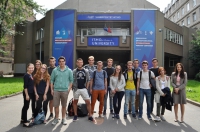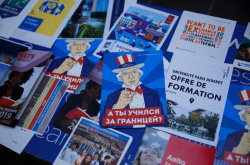Amongst the participants are students from different European Universities, including the University of Mons (Belgium), Oslo and Akershus University College (Norway), Masaryk University (Czech Republic) and Ca’ Foskari University of Venice (Italy). 20 students were split into 2 groups according to their level of Russian. Each day starts with regular lessons in the morning, then the students visit museums and explore the city in the afternoon. They also experience the lifestyle of the Northern Capital by going to clubs and restaurants. The overall length of the summer school is three weeks.
“The Internationalization Department developed this program in order to immerse them (students) into Russian culture, to show all of its sides. That is why we focused on tourism almost as much as we did on the regular classes. Our students are future Russian teachers and translators, in other words – people who will later contribute to Russia’s international relationships and the internationalization of Russian education, our university included”, - comments Ms. Natalya Kondrashova, head of the Chair of Russian as a Foreign Language.

She adds that the most difficult part during the development of the program was to fit all the necessary material into the limited study time. The Chair’s staff tried to make the lessons as informative and interesting as possible; in return, all the students were really eager to learn. For most of them this trip to Russia was their first.
“This is a great opportunity to improve my language skills. I heard about this summer school at my university, and decided to go – which I don’t regret in the least. By the end of the first week, I already felt that my Russian had improved considerably”, - comments Fedra Livia from the University of Mons.

Students from Belgium add that before the course, their vocabulary was limited to common words like “Hi”. Thanks to the summer school, they have not only increased their vocabulary but improved their grammar as well, which is considered the hardest part of Russian language from a foreigners point of view. Obviously, being taught by native speakers played its part as well.
“It’s really useful to listen to people talking in ideal Russian – you can learn by repeating after them. We also got access to Russian books which we don’t have in Belgium. During the program I got the chance to systemize my knowledge – for that, I’m really thankful. Our teachers were very patient, and possessed great knowledge of Russian history, the history of St. Petersburg, and national culture in general”, - adds Julienne Ensh from the University of Mons.

The students joke about them having returned to their childhood days as they had to buy handwriting worksheets and learn to write Russian characters properly. Still, it was easier for them to adapt to being in St. Petersburg due to their basic skills in Russian. They say that they are definitely going to recommend this summer school to their friends.




